The Senate Picks The Filibuster Over Democracy
Dispatches on the Freedom to Vote Act (Edition #40)
Welcome back to the Equal Citizens Substack.
This is a tough update to write. As I’m sure you know, the vote to fix the filibuster failed on Wednesday, which means, at least for now, the Freedom to Vote John Lewis Act (FTVJLA) cannot become law. As I’ll explain below, while all fifty Democrats voted to advance the FTVJLA, without rules reform, the bill was blocked by a Republican filibuster and there’s no available work-around.
This is disappointing — and, frankly, tragic. Our Equal Citizens team will take a few days to process what happened and figure out the next steps. But, before you get too down, I want to be very clear about something: the movement for a better democracy will continue. We learned a lot over the past year about what a national mobilization for democracy reform could look like — what worked and what didn’t work — and this effort will serve as the catalyst for future, stronger mobilizations. I promise you that.
One indication of just how fertile the soil is for our collective future endeavors: Right before the final vote on Wednesday, Equal Citizens and Un-PAC released a Data For Progress poll that showed voters not only want Congressional action on the FTVJLA, but they also support filibuster reform to pass it. In total, we found that 63% of likely voters support the Freedom to Vote John Lewis Act, including 82% of Democrats, 62% of independents, and 42% of Republicans. And 53% of voters support reforming the filibuster rule to pass the Freedom to Vote John Lewis Act. You can read the blog post we wrote about the poll here.
These are incredibly encouraging results and should serve as a reminder that we have the majority of the American electorate on our side. We have no choice but to keep fighting.
The Senate Fails to Fix the Filibuster:
On Tuesday, Senate Majority Leader Schumer kept his promise: The Senate began a debate on the FTVJLA and rules reform. As we explained last week, Senate Democrats had found a way to bypass the first of two possible filibusters on the FTVJA (on the motion to proceed to debate), so there was no procedural vote that could stop this debate from happening.
Throughout Tuesday, and into the late hours of Wednesday night, Senators took to the floor to discuss voting rights, campaign finance, gerrymandering, election subversion, and whether it was appropriate for the Senate to change the rules of the filibuster to allow the FTVJLA to pass with a simple majority. In many respects, the floor of the Senate resembled what a functional legislative body could look like. Almost all the Senators were present, listening, and even engaging in debate. It was highly contentious, and there was a good amount of misinformation from Republicans about the FTVJLA, but overall, it was genuinely encouraging to witness.
By Wednesday evening, when the debate had run its course, Majority Leader Schumer called for a vote to end debate and move to a final vote on passage of the FTVJLA. (Remember, this is where a second filibuster could take place, one that was unavoidable even with parliamentary maneuvers.) As expected, all fifty Democrats voted to advance to the final vote. And all fifty Republicans voted in opposition. As such, cloture (requiring 60 votes) could not be reached and the bill could not advance.
Multiple times throughout 2021, the Senate got to this point, and each time the same thing happened. The filibuster prevented an up-or-down vote on pro-democracy legislation. Unlike the previous attempts, however, on Wednesday Senate Majority Leader Schumer immediately called for a vote to change the Senate rules. He offered to replace the current filibuster rules (only in this instance) with a version of a talking filibuster. It is worth emphasizing how reasonable a change this would have been — the minority party would have been able to talk indefinitely, but after they were finished, a simple majority could end debate and proceed to vote on the bill.
On the topic of rules reform, the Senate then debated for about an hour. There were great speeches from a variety of Senators, including Senator Merkley, who provided an overview of the history of the filibuster. At one point, Senators Merkley and Manchin even got into a back-and-forth about Schumer’s proposal.
Unfortunately, when the final vote on rules reform was called, the proposal failed 48 to 52 (it needed 50 to be approved). As we feared, Senators Manchin and Sinema both sided with all 50 Republicans to doom it. By voting against the rules reform, these 52 Senators effectively voted against protecting voting rights, for as long as the filibuster remains intact, the FTVJLA cannot pass.
Before moving on to the next update, there are two Senate speeches I wanted to highlight.
First, Senator Raphael Warnock gave absolutely stellar remarks. I could describe them, but instead, I highly suggest watching the video linked here in its entirety.
Senator Bernie Sanders also hit a home run, underscoring the illogical position of those “supporting” the Freedom to Vote John Lewis Act, but opposing rules reform (i.e. Senators Manchin and Sinema). He explained:
“If you think this bill makes sense and if you're worried about the future of American democracy and if you are prepared to vote for the bill, then why are you wasting everybody's time and not voting for the rule change that allows us to pass the bill? You know, it's like inviting somebody to lunch and putting out a great spread and saying you can't eat. If you're going to vote for the bill, vote to change the rules. Mr. President, We changed the rules to prevent a default on our national debt, we can change the rules to confirm supreme court justices, we can certainly change the rules to save American democracy.”
Activism Provides Hope for the Future:
In the run up to the vote, our allies at Un-PAC continued their hunger strike in front of the Capitol building. Their sacrifice generated significant press coverage, as we detailed last week.
On Tuesday, they took their actions one step further. A group of the hunger strikers, in coordination with a coalition of faith leaders and democracy organizers, engaged in a sit-in on the Capitol building steps and were arrested. The hope was that this action — which included participants from Arizona and West Virginia — would put final pressure on Senators Manchin and Sinema to do whatever it took to pass the FTVJLA (i.e. reform the filibuster). While we know that ultimately nothing changed Sinema and Manchin’s minds, this effort on Tuesday did generate a ton of positive press coverage, including from The Washington Post (see here).
On Thursday, after the vote, Un-PAC decided to do one final protest. The goal was to show that, despite the short term failure in the Senate, the movement to protect and expand our democracy would continue. So hunger strikers, joined by our Executive Director Adam Eichen, Elizabeth Hira (our ally at the Brennan Center), representatives of the Workers’ Circle, and more, engaged in a sit-in near the Capitol, holding up signs that said “Justice matters more than Senate rules.”
Representative Jamaal Bowman, a first term Member of Congress from New York, visited Thursday’s protest and — in a courageous display of solidarity — joined the protesters and was arrested, as well. Overall, this protest generated an incredible amount of publicity; it was covered by the Washington Post, USA Today, Huffington Post, The Daily Beast, CNN, MSNBC, and by countless other outlets.
Here is more from Adam about Thursday’s event:
“It was such an honor to join the Un-PAC hunger strikers and other allies in this act of protest. I went to bed on Wednesday night extremely disappointed by the inaction in the Senate. But when I arrived and stood shoulder-to-shoulder with these courageous folks, I felt rejuvenated and energized to continue my work.
We held a rally a few blocks from the Capitol and when the speakers were finished we began quietly marching towards the Capitol building. The police had barricaded the entrance to the Capitol grounds, so we walked as close as we could and collectively sat down in the street. As the press began to gather, and as the police told us that we were in violation of the law, our group began to sing and chant. It was a joyous moment of defiance in the face of political dysfunction. The police slowly removed us from the ground, one by one, and we accepted the arrests without struggle. Soon, Representative Bowman arrived and crossed the police tape where we were being held. He was arrested, and we all expressed our profound gratitude to him for standing with us — and he expressed similar sentiments back to us.
I did not make the decision to get arrested lightly. Engaging in civil disobedience is a solemn act, with deep roots throughout history in movements for equality and freedom. For civil disobedience to be effective, there should be good cause and it should fit into a larger strategy for the movement. There is no question that the cause — our cause — is worth putting our bodies on the line for. But what about strategy? It may seem strange that we decided to risk arrest after the vote was over. But as my dear friend Elizabeth Hira argued to me the night before, our responsibility in this particular moment was to bear public witness to the unjust actions of our representatives and to remind others — throughout the country — that a short term loss is not the end. Two Senators will not get to decide the fate of American democracy. We can mourn in the short term, if only to allow us the space to get back to work on Monday.
That message got transmitted far and wide — so mission accomplished.
As William Hastie, the first African American federal judge, explained, ‘Democracy is a process, not a static condition. It is becoming, rather than being. It can easily be lost, but never is fully won. Its essence is eternal struggle.’ Let’s keep these sage words in mind as we prepare for our next steps.”
The Path Forward:
National standards for ballot access, a ban on partisan congressional gerrymandering, transformative federal campaign finance reform, and the restoration of the Voting Rights Act are now temporarily out of reach. It will take some time to figure out what options are on the table in Congress moving forward. There are some early talks about reforming the Electoral Count Act and preventing election subversion. We will monitor these efforts closely.
What we do know is that the fight for democracy reform will continue in states across the country, and voting rights will become a prominent issue in the 2022 campaign season. I cannot say this enough: We are not giving up. We will redouble our efforts and continue to fight.
You might be asking, what’s next for this Substack. After all, it is the Equal Citizens on the Freedom to Vote Substack! Well, we have to figure that out. In whatever form it takes, though, we will continue to use this Substack as a place to keep you up-to-date on the movement for a better democracy. So stay tuned and keep spreading the word about our work. And if you have suggestions for what we could cover, please write me at info@equalcitizens.us
Regardless of the next steps, I want to take a moment to thank you all for reading this Substack over the last year. I can’t tell you how much of a pleasure it has been for me to write these newsletters.
In the News:
New York Times Columnist Charles Blow criticizes the Senate’s failure to pass federal voting rights legislation. Blow argues that while the Republicans are the true villains in the voting rights story, the failure of Democrats to stop them is beyond disappointing.
Sam Levine writes in The Guardian about what happens next for voting rights. He argues that the inaction by the federal government will embolden anti-democratic forces in states across the country.
In the Washington Post, Nicole Willcoxon chronicles the consequences of not restoring the Voting Rights Act. The researcher concludes:
“Comparing 2016 to 2012, voters in counties formerly covered by preclearance were significantly less likely to turn out than their peers in counties that were never covered.”
The Hill reports on Congressman Bowman’s arrest during Thursday’s voting rights protest at the Capitol. The Congressman joined the hunger strikers and other activists in nonviolent civil disobedience.
Bonus: Opinion: Giving up on Voting Rights now would be Unconscionable
Don’t forget to keep your friends, family, and colleagues in the loop by sharing this Substack with them.
Social Media Roundup:
Let’s be frank: there are A LOT of tweets, posts, and general conversation about the Freedom to Vote John Lewis Act. In this section, we give you an overview of the tweets and media you really need to see.



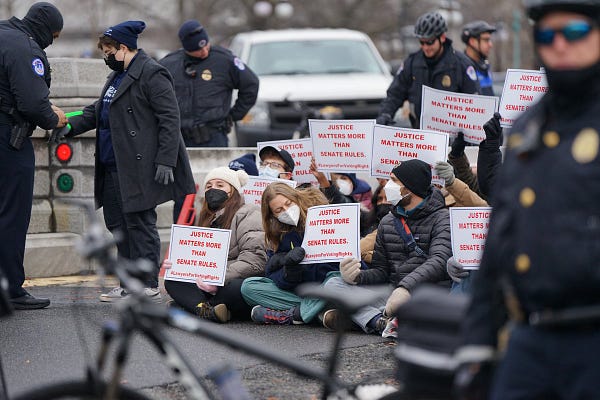







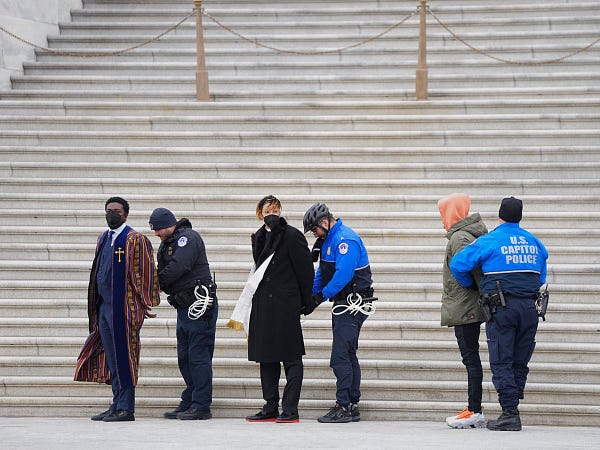


More About Me:
Kevin Rissmiller is a fellow at Equal Citizens and a Goodwin-Niering Scholar at Connecticut College majoring in Government and exploring sociology, economics, and applied statistics. In his free time, you will find him at Dunkins or (pre-pandemic) playing ultimate frisbee. Connect with him on LinkedIn.
If you want more updates on voting rights from Kevin, then subscribe here!



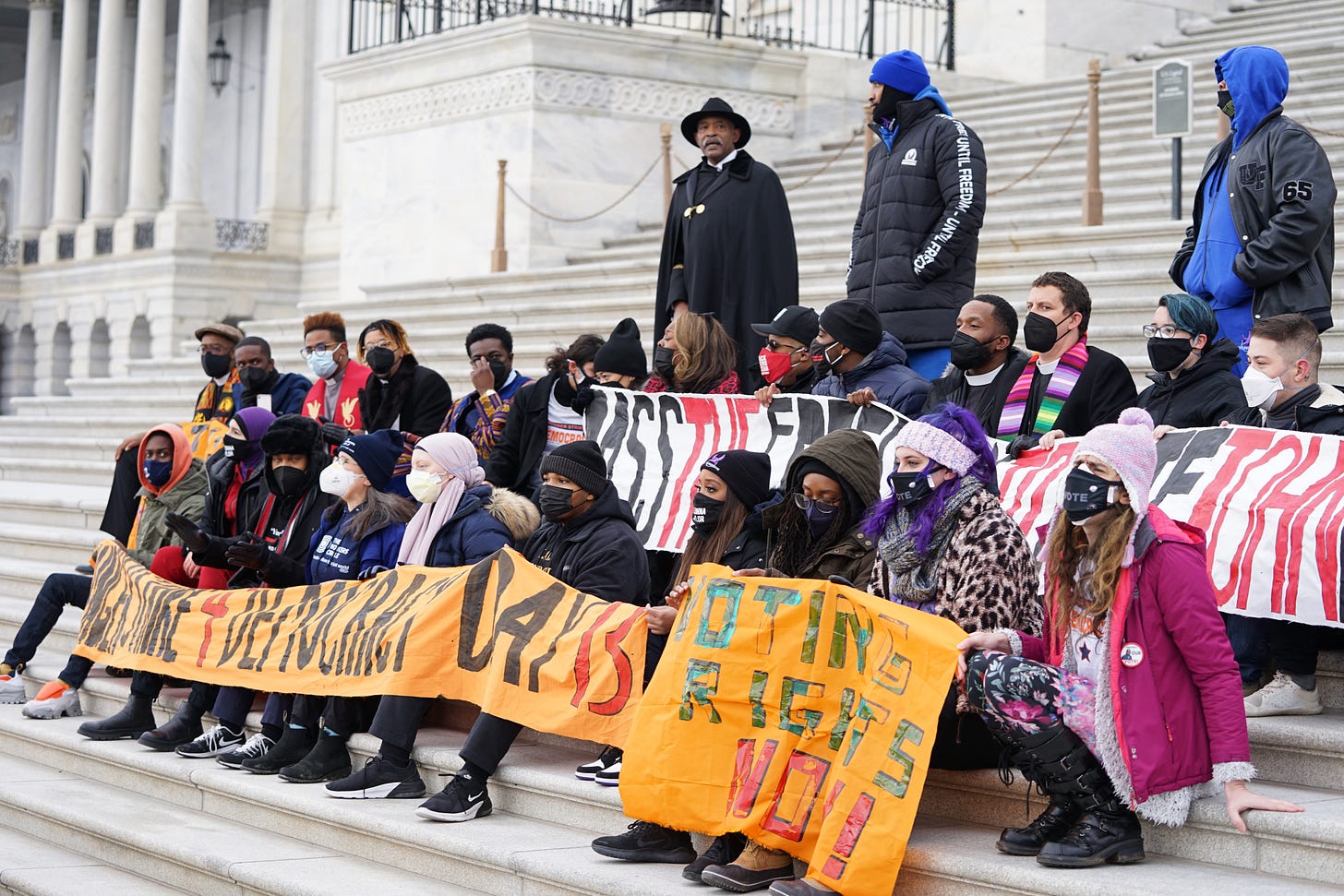
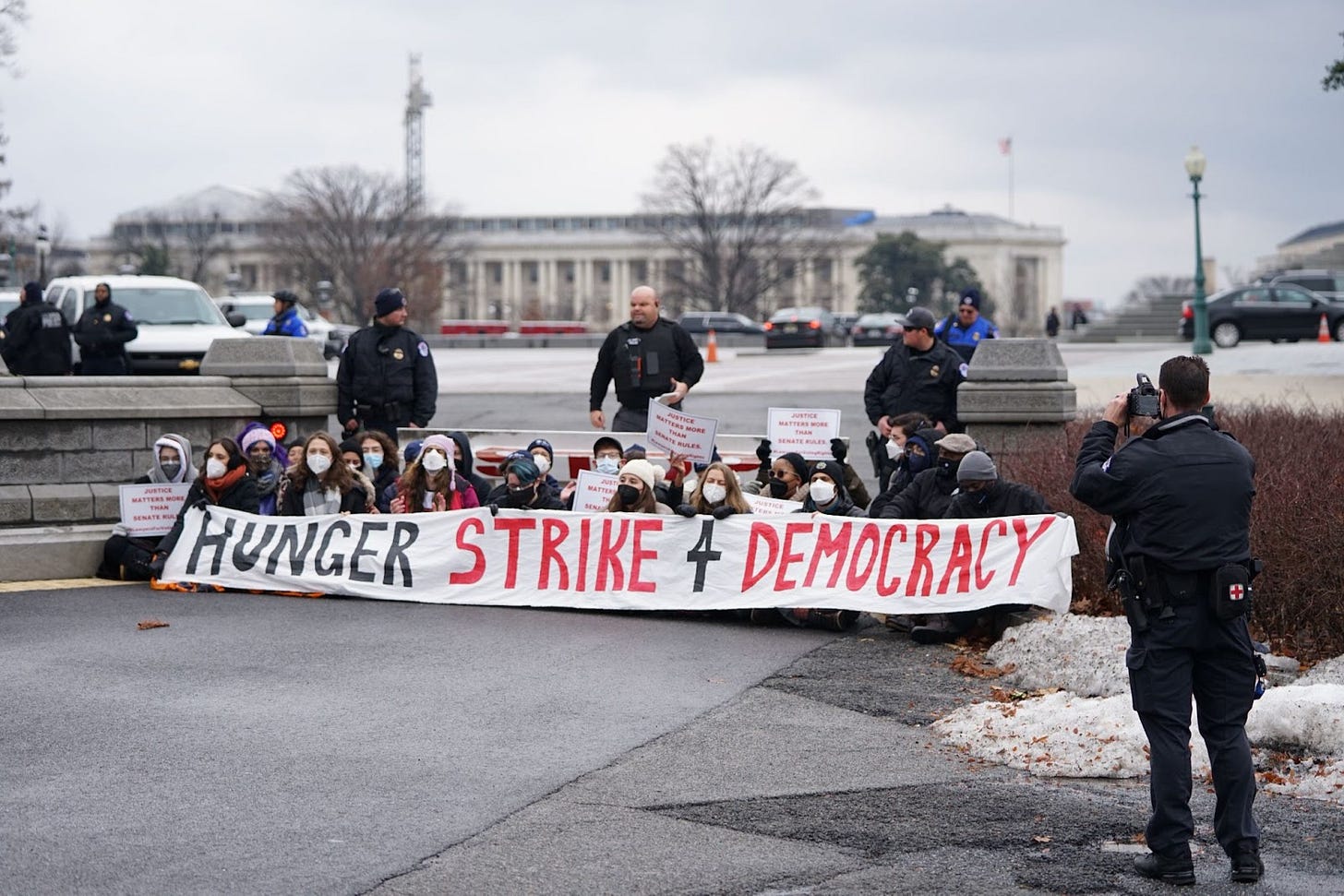
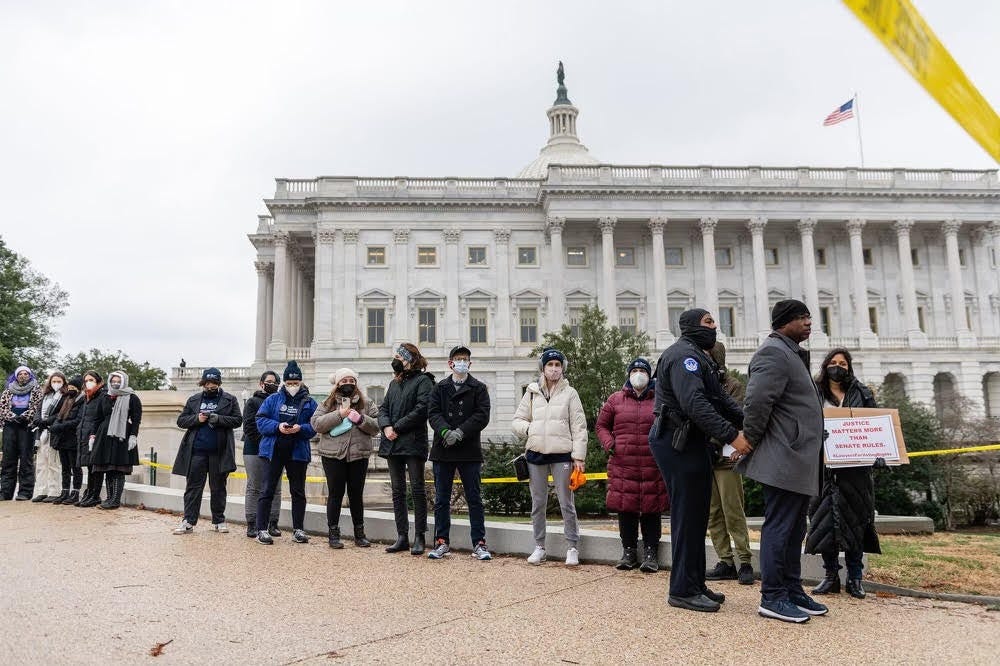
Kevin, you did a fantastic job keeping us well informed and alerted to opportunities to participate. Many thanks!